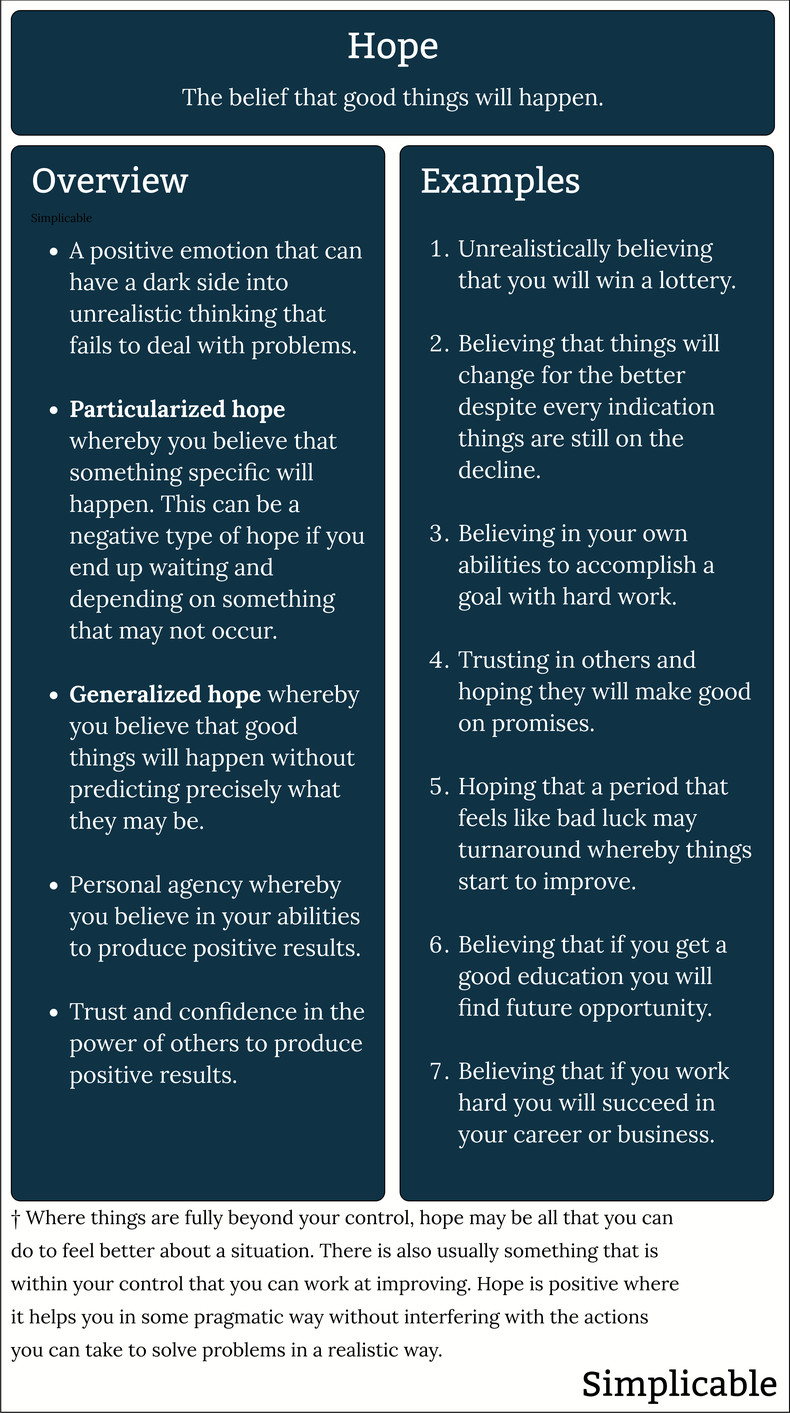
Optimism
The confidence to take calculated risk and work towards the future with the belief you can achieve good things.Positivity
A general habit of looking for the positive in situations and people including yourself.Particularized Hope
The expectation that something specific will happen that is beyond your control. For example, the expectation that you will become a famous musician. This can be a dark type of hope as it leads to disappointment if your specific expectation fails to materialize.Generalized Hope
The expectation that good things will happen and that their form and timing will be unpredictable. This can be viewed as a general trust that life is good such that things will work out somehow. As compared to particularized hope, this is less likely to result in disappointment as you keep an open mind about how things might be good.Agency
Agency is the degree to which an individual believes they have the power to change things. This can result in a positive type of hope whereby an individual sees a bright future based on trust in their abilities and energies.Belief
The belief that something greater than yourself will bring good things.Trust
Trusting others to do good things.False Hope
Expecting things that are almost certainly not going to happen. A dark type of hope that can result in wasted resources and disappointment.Denial & Avoidance
A type of false hope that is based on not facing a problem.Pessimism
Pessimism is the view that bad things are likely to happen and that risk takers are foolish.Defeatism
Defeatism is pessimism that interferes with the performance of your responsibilities. For example, a pilot who feels a plane is surely going to crash so they give up.Schadenfreude
Schadenfreude is the enjoyment of the problems and failures of others. This can result in joyful hope that something bad will happen to other people. This is largely viewed as a negative emotion that is counterproductive.Abundance Mentality
Abundance mentality is the belief that there is enough for everyone such that most situations are win-win. This allows an individual to hope for the success of those around them without any sense that this diminishes their own success.Trough Of Sorrow
The trough of sorrow is the painful stretch of time between the excitement of starting to work towards a goal and actually achieving any meaningful results. This period requires hope and/or confidence in what you are doing as it can be a prolonged period that sees many problems and few rewards.Business As Usual
Business as usual is the process of continuing your life without loss of energy in the face of extremely dark days. For example, the citizens of a country at war who continue their to fulfill their roles and responsibilities under bleak and demoralizing circumstances.Active Hope
Hope that is backed by your hard work and creative energies.Anticipation
Anticipation is an excitement and passion that emerges with visualization of the immediate future. For example, Norse mythology represents hope as the slobber dripping from the mouth of Fenris Wolf. This is interpreted to mean that by anticipating victory you make victory more likely as it stimulates your energies and appetite.Acceptance
Accepting what you can't change, particularly the past, and placing your hope in those things you can change.Unaffectedness
Unaffectedness is the state of being difficult to influence. For example, a self-confident individual who isn't easily affected by criticism or praise. This can result in a stability of hope whereby you aren't discouraged one moment and overconfident the next.Gratitude
Gratitude is thankfulness for what you have. This is associated with a calm state of hopefulness whereby you belief you will get what you need -- perhaps in a strange and hard to understand way.Stoicism
Stoicism is a complete indifference to bad luck or good luck such that you are only concerned with your own virtuous response to each situation. This can be viewed as absolute indifference to hope without loss of positivity. Stoicism has profoundly influenced Western civilization beginning with the stoic philosophers of the Hellenistic world and the Roman Empire.Summary
Hope is a positive way of thinking that has a dark side where it steps into delusional thinking that prevents someone from solving problems.
| Overview: Hope | ||
Type | ||
Definition | The belief that good things can or will happen. | |
Related Concepts | ||





































